Not to brag, but I’ve been shopping secondhand since my time in the womb. When my mom was pregnant with me in the early ‘90s, she’d wander the booths at the West Wind Capitol Flea Market in San Jose with $5 to stock up on craft tools and costume jewelry.
As a kid, I’d explore the flea market, too, perched on my dad’s shoulders with a bird’s eye view of books and Barbies. In college, I’d spend hours in consignment shops hoarding CDs and clothes on a shoestring budget. Around the same time, I started browsing Goodwills and other local thrift offerings in the Bay Area for home essentials.
Given that I’ve been shopping secondhand for my entire lifetime, you might be surprised to learn that I only started going to estate sales this past year after I unceremoniously hit 30. In an effort to hunt down good inventory for my online shop, I looked into other sources to find vintage pieces. Enter the estate sale.
When it comes to the world of vintage shopping, estate sales can slip under most people’s radars. They’re tricky to find and have a reputation for being kind of pricey. But I’ve found that if you play your cards right and strategize, you can scoop up amazing deals on real vintage. The items up for sale usually belong to an older person with a lifetime’s worth of curated items, so it’s different than sifting through the bevy of Shein and Amazon fodder at your local secondhand shops.
Anyway, I’ve learned a whole lot about estate sales over the last three months and wanted to impart some of my wisdom. Here’s a complete beginner’s guide to shopping at estate sales.
What is an estate sale?
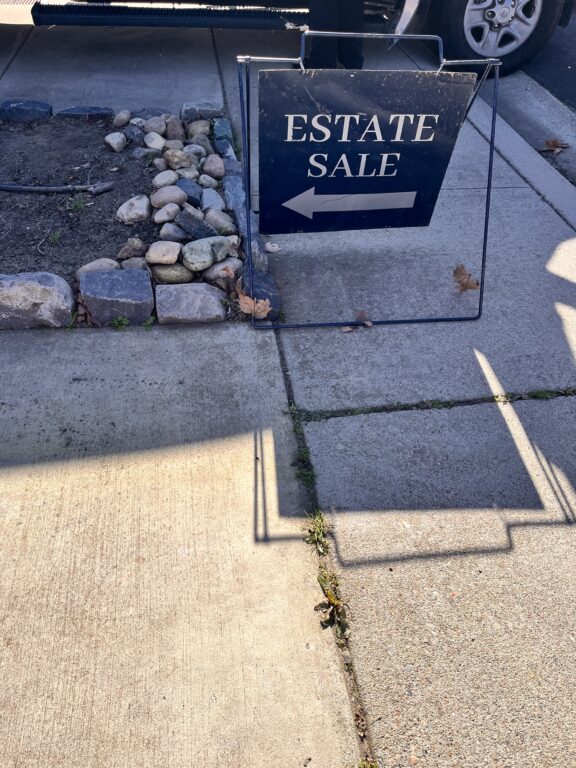
An estate sale is a means for people to sell off the belongings within a house (or, obviously, an estate). Usually, it’s held by a liquidation or clean-out company for the family of the deceased, and the company will get a cut of the sales. However, estate sales can be held for a variety of reasons, whether you’ve gone through a divorce, need to downsize, or plan on moving.
On a psychological level, it can definitely feel weird picking through the belongings of someone who just died. Stuff might be haunted (kidding), and you might feel a bit like a vulture hunting for scraps. But it’s worth remembering that you’re doing the family of the estate a favor by helping them unload stuff and recoup some cash. Just be a decent human being — don’t haggle for lower prices, trash the displays, or engage in any other unsavory behaviors.
What can you find at an estate sale?

Literally EVERYTHING. You can pick up craft tools, beauty products, seasonal decor, cleaning supplies, toys, home goods, books, CDs, furniture, electronics, clothes, garden supplies, kitchenware, power tools, and so much more.
What are some tips for shopping at estate sales?
Now, onto the good part. Here are my go-to tips and tricks for shopping at estate sales.
1. Regularly browse platforms like EstateSales.net, Facebook Marketplace, and Craigslist for estate sale listings.
So you’ve Googled “estate sales near me” without much luck. When it comes to hunting down sales, EstateSales.net is your most reliable source here—I even have the app installed on my phone. Organizers will usually give basic information like the dates and city of the sale a week before the actual event and disclose the address the day prior.
EstateSales.net is the most legit estate sale finder, but Facebook Marketplace and Craigslist can offer hidden gems. These platforms are usually reserved for people organizing sales informally rather than working with a company. While you might get really good deals, obviously be very discerning of scams and other sketchy ordeals.
Also, never underestimate word of mouth! I often see the same people at thrift stores and estate sales around my nook of the Central Valley, and every so often, they’ll tell me about a great local sale.
2. Look at estate sale items ahead of time online.
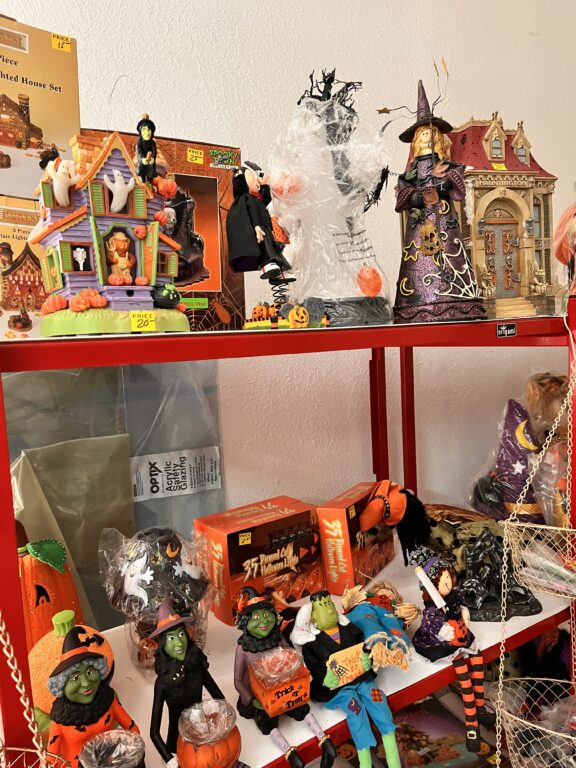
Usually, organizers will take pictures of the items up for sale and upload them online. Good sale organizers will take literally hundreds of pictures. This way, you can gauge whether or not you’re interested in the items available…and if you’re interested enough in particular items to show up early.
3. For the best deals, hit up the estate sale late.
When I first started going to estate sales, I was, by incorrigible personal habit, an early bird. I would arrive early in the morning on the first day of the sale, anxious that everyone would pick up the good stuff first. Here’s the thing: Estate sales are notoriously pricey and you often won’t see price tags in the listings.
Unless you REALLY want something, you could save big if you go to an estate sale during its final hours, when the people running the sale desperately need to clear stuff out. The last day of an estate sale is usually half off…or better! It’s not uncommon to find items for 75% off on the last day. During one estate sale I went to, they gave people boxes to fill up for $25 during the final hours. (Personally, I like taking my time to browse for things, but a deal is a deal.)
4. If you really want something, show up early!
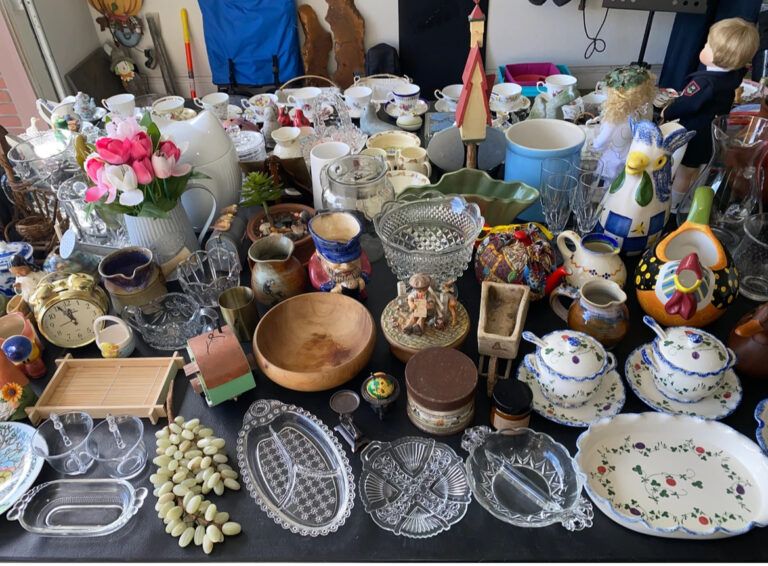
On the flip side, if you see something you REALLY want on a listing, be sure to get to the sale SUPER EARLY. Today, I went to an estate sale 30 minutes after opening and the costume jewelry that I really wanted were already sold out.
5. Go through the rooms a few times.
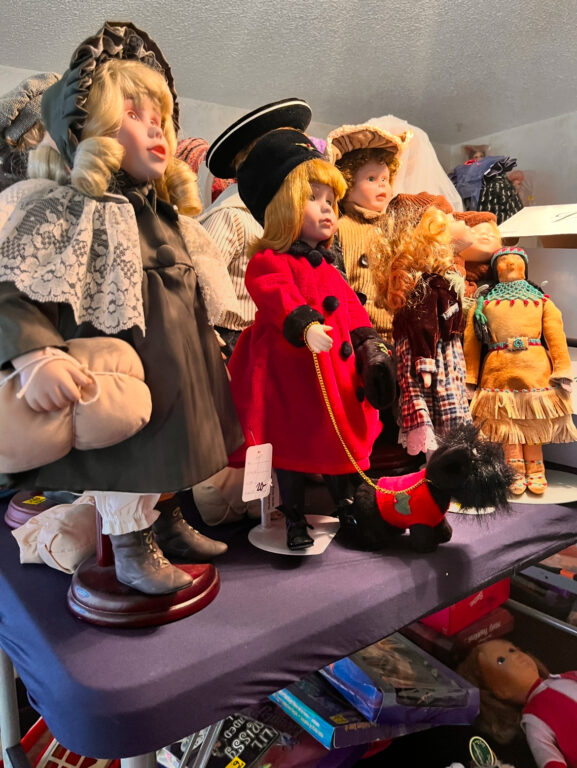
I like taking my time at estate sales, but this slow and steady approach can be challenging if you stop by on a busy weekend. To make sure I don’t miss anything good while weaving through the crowds, I check each room at least twice. You develop an incredible amount of patience when you become a treasure hunter — that, or you become the jerk who shoves people. Don’t be the jerk who shoves people.
6. Inspect items carefully.
One thing I’ve noticed is that estate sales can be DIM. If you want to save your phone battery, invest in a small flashlight to check for tears, cracks, and chips. If the checkout table is outside, bring your items to a sunny spot to look for defects.
7. Bring cash.
Since businesses have to pay for card transaction fees, there might be a small upcharge if you use card. This fee usually won’t be more than 3-5%, but it’s definitely worth noting. Some sales are also cash only, so be sure to read up on listing details to prepare accordingly.
8. Bring a bag.
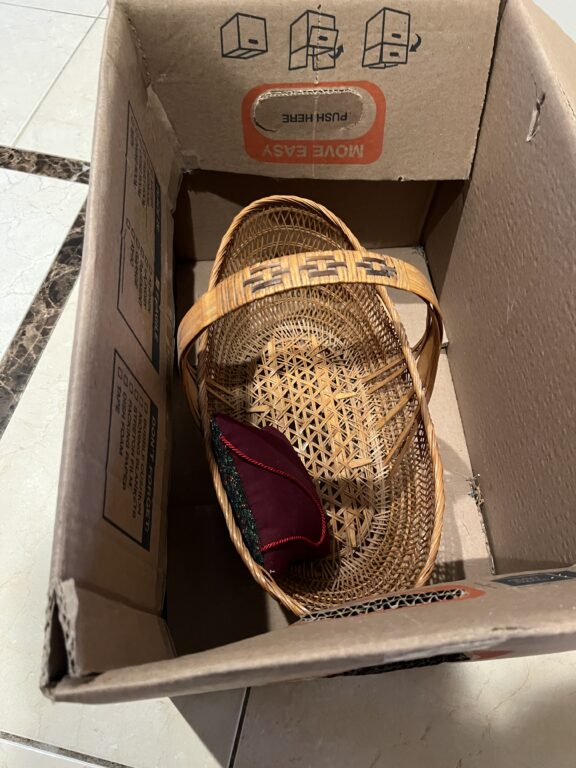
Some sale companies might have baskets, boxes, hold tables, or clear shopping bags, but many of them don’t, so you’re responsible for holding your own stuff. I recommend bringing a large tote bag with you so that you can carry all of your items neatly. Check if the estate sale organizers will allow this. They usually will, since you need to carry your own stuff out.
9. Get to know your local sale organizers.
My favorite part of the vintage reselling business is bumping into the same faces over and over again, whether it’s fellow vintage lovers or other secondhand dealers. While you don’t need to be BFFs with your local sale organizers, it can be helpful to know their pricing ranges and discount structures. Go to a few sales and get a feel for how the company likes to run things. Also, some companies use social media while others don’t. If you like a specific company, ask the seller if they have an email or text list you can join to be in the know about upcoming sales.
So, has this post piqued your interest in the estate sale scene? As someone who pretty much goes thrifting every other day, it can be nice to have a change of scenery, and estate sales are bound to be different every time. Incorporate some of these strategies into your next estate sale adventure for a seamless vintage shopping spree!
Brief announcement: I recently started an Etsy shop, where I sell brass, brooches, and other tiny vintage treasures. As a thank you for reading my post, I’d like to offer you a special limited-time discount. Enter “SAVE15” at checkout for 15% off your next purchase!
